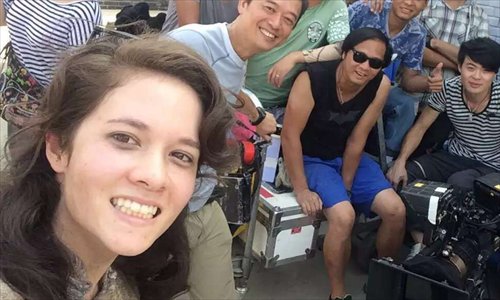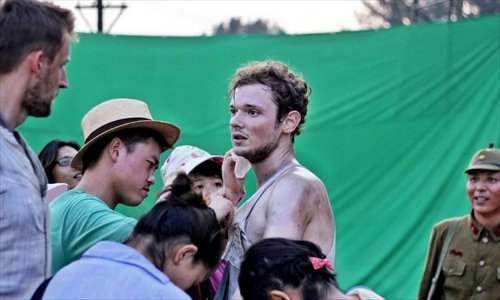Journey to the East
Expats discuss the good and bad in the Chinese entertainment industry

Actress Augusta Xu-Holland takes a selfie with the crew of The Last Race. Photo: Courtesy of Augusta Xu-Holland.

Zach Ireland (center) on the set of The Last Race Photo: Courtesy of Zach Ireland
Sitting in a cafe within Beijing's East 3rd Ring Road, 25-year-old American actor Zach Ireland casually orders a cup of coffee after a quick glance at the menu.
Although Ireland is now very familiar with what is one of the most modern and commercialized areas of the capital, about three years ago his expectations of what he would in China were just the opposite.
"I thought every morning I was going to wake up because a rooster was going to go 'gulu gulu gulu.' I thought it was going to be like living on a mountain side," Ireland tells the Global Times.
As China becomes increasingly connected to the rest of the world, an increasing number of foreign faces are appearing in people's lives as well as in TV shows and films.
As a result, the demand for foreign faces on screen has increased. Ireland is one of the many expats working in the entertainment business in China. Like many of them, he has given himself a Chinese name so Chinese audiences have an easier time remembering him - Ireland calls himself Zuo You (Left Right),
Fitting in
Given the fact that World War II films and TV dramas belong to one of the most common genres in China at the moment, Ireland frequently finds himself playing foreign soldiers. In addition, his youthful looks help land him roles as high school and college students. While most of these roles have only been supporting characters, Ireland excitedly tells the Global Times about the one time he traveled to Wuhan, Hubei Province, where nearly 4,000 fans welcomed him screaming his name and offering him presents.
"When I was in university [studying acting] I was thinking where I should go to start out and of course people like to go to New York, LA and Chicago. But I realized if I went there it would be quite boring," Ireland says, explaining his reasons for choosing China as his career destination during a time when many Chinese are heading to the US.
"Even though they are wonderful and great cities, because they have a very familiar culture I am used to, I would end up doing the same thing I was always doing."
"There are tons of amazing actors here as well, but in New York and LA there are at least 100 to 200 people who look exactly like me. In China the competition is much lower," he adds.
Yet, his experiences have not all been positive, especially at the start.
Since kung fu is such a prevalent part of Chinese culture, Ireland spent some time studying the martial arts after arriving in China. However, when it came to using these skills in film, his roles only ever demanded he know how to take a punch.
Additionally finding work can also be frustrating since Chinese agencies often only provide very vague information about the foreign role they are trying to fill.
"It does bother me when there were auditions and some agency contacts me and they say 'We are looking for a foreign man for this movie.' And I am like, 'Okay. How old is he suppose to be?'" Ireland says, explaining that he once showed up for an audition that ended up being for a character that was 60 years old.
While things are getting better as agencies become more specific as to what they are looking for, there are still situations that annoy him and his fellow expat actors.
Ireland tells the story of a black actor friend of his from the US. When this friend went to an audition for an American character, they told him: "You don't look American."
"The idea of what a foreigner looks like here is just different," Ireland notes. However, he points out that China should not carry all the blame as US-made TV shows and movies often provide a misleading picture of the country.
"Not ethnically balanced," is how Ireland puts it, explaining that popular US dramas such as Two Broke Girls, Friends, and The Big Bang Theory have all white casts.
Calling on two worlds
While Ireland studied acting, actresses Augusta Xu-Holland (24) and Tazmyn-May Gebbet (18) had no previous acting experience, instead, to some degree, getting into the industry thanks their special identity and bilingual background.
Though English has been a compulsory subject in China's middle schools for decades, since many Chinese have few opportunities to use it, the number of people who master the language is still low. However, the globalization of industries like the TV and film industry means an urgent demand for a large number of bilinguals.
"They were looking for a foreigner for this role. I felt a little nervous being also half Chinese, but it turned out people can be quite flexible," Xu-Holland says of her role in upcoming war film The Last Race. She adds that she later found that her mixed-background was an advantage rather than a disadvantage since she could better understand the film and how it was being made.
Besides playing a British woman for the film, the New Zealand-Chinese actress has played a Russian diplomat and modeled for fashion brands and online games. With her mixed-race background, Xu-Holland is confident in her ability to play Chinese, Western, as well as mixed-race characters, though she also believes with the globalization of China, there will be more job opportunities for foreigners from other heritages in the film and TV industry here.
Still a college student, The Last Race gave Gebbet her first film role. She actually started as a production assistant on the film who did translation work most of the time.
"However the caster spotted me and asked me to be an extra and later to play Margaret, Florence Liddel's sister," the young British-Chinese woman told the Global Times through WeChat. Though Gebbet strongly holds the opinion that "fitting the role" is the main reason she as well others got into the film, she admitted being able to speak more than one language "is a draw to employers of any job."
Although there have been missteps along the way, Ireland is very satisfied with his journey to the East because he has been able to "sit in a very unique position."
"I get to see these parts of China that even many Chinese have not been to," he says.
As for Xu-Holland and Gebbet, though their time shooting the film has been tough, they remain excited about the opportunity.
"If it had been easy it wouldn't be so rewarding," Xu-Holland says.
.